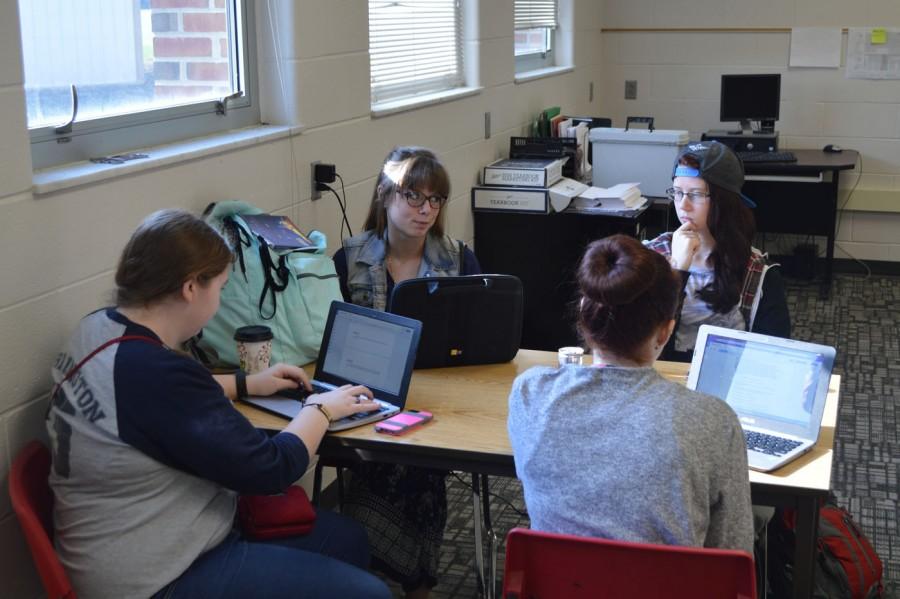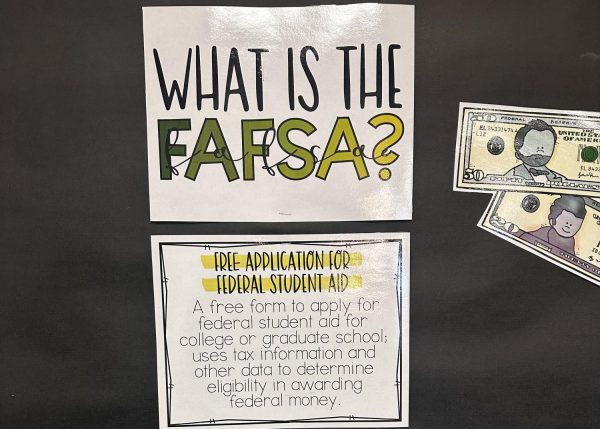Teachers aid in AP test preparation
Juniors Gabby Rickets, Holly Pruit, Katie Beard and Calista Richardson work on assignments in Sam Hanley’s AP language and Composition class.
April 25, 2016
As A.P. tests get closer and closer, teachers, such as Amanda Schnepp, Christina Ferguson, Nathan Fishel and Dawn Fowerbaugh are beginning final preparations to assist their students in passing their respective exams. While no two teachers are prepping in the exact same way, there does seem to be a common theme of trying to encourage students and make sure that they have the ideal morning the day of the test.
“I’d say test prep is important if you want a majority of your students to be successful,” Ferguson said. “I think it does help as far as taking out the shock effect of ‘this doesn’t look anything like what we’ve been doing all year.’ They know the calculus, so I think it helps with them knowing the format of the test.”
Students can take advantage of practice in class, after- and before-school study sessions, reviews during iPass, one-on-one help with their teacher and even practice of the actual test with a few mock exams.
A.P. Biology teacher, Schnepp, says that she is still teaching her students core material instead of doing a lot of review and prep. She has been mimicking her exams like the A.P. test all year, a practice she hopes will make the passing rate on the actual A.P. test go up from the 63 percent passing rate from last year.
Ferguson, who teaches A.P. Calculus, says that she makes the review like one big chapter that includes things like a mock exam, multiple choice practice, stations and free response writing. She also says that her class has been divided up into “families.” Each family is a group of students in her class whose quiz scores are combined and averaged. The higher the average score, the more each family moves up on a race track she has at the front of the room. Ferguson gives her students incentives by giving rewards to the family that does the best.
“Whichever team gets the farthest by the time we get to the actual exam, they get some gift cards,” Ferguson said. “We kind of do some competition with them too.”
Fishel, who teaches A.P. U.S. History, has been holding review sessions during iPass for his students such as sophomore Madison Gomez. This is to review everything they’ve gone over throughout the year and talk about the format of the test.
“I feel like the sessions are beneficial because it gives me review instead of having to look through notes,” Gomez said, “and basically he’s reteaching it, and his teaching style has always helped me… do better on (document based questions).”
Fowerbaugh says she has been reviewing the three main types of essays, synthesis, analysis and argument with her A.P. Language and Composition students. Multiple-choice practice and a mock exam have also been integrated into the review. Fowerbaugh says she wants her students to sit and take the exam so they understand the kind of stamina needed to complete the real exam. The passing rate for the A.P. Language and Composition exam over the past few years has been around 30 to 40 percent, according to Fowerbaugh.
“A.P. is an open enrollment class meaning anyone can sign up for it,” Fowerbaugh said. “It is also an extremely different kind of writing than what students are used to.”
Several A.P. test takers are going to be served a homemade breakfast made at school by their teachers, who are going to try their best to get their students to relax and do well on the test.
“Breakfast is a time for us to get together as a group,” Fowerbaugh said, “and I always tell them I want them to do their best. I kind of mom them a little bit, and I just try to pump them up.”








